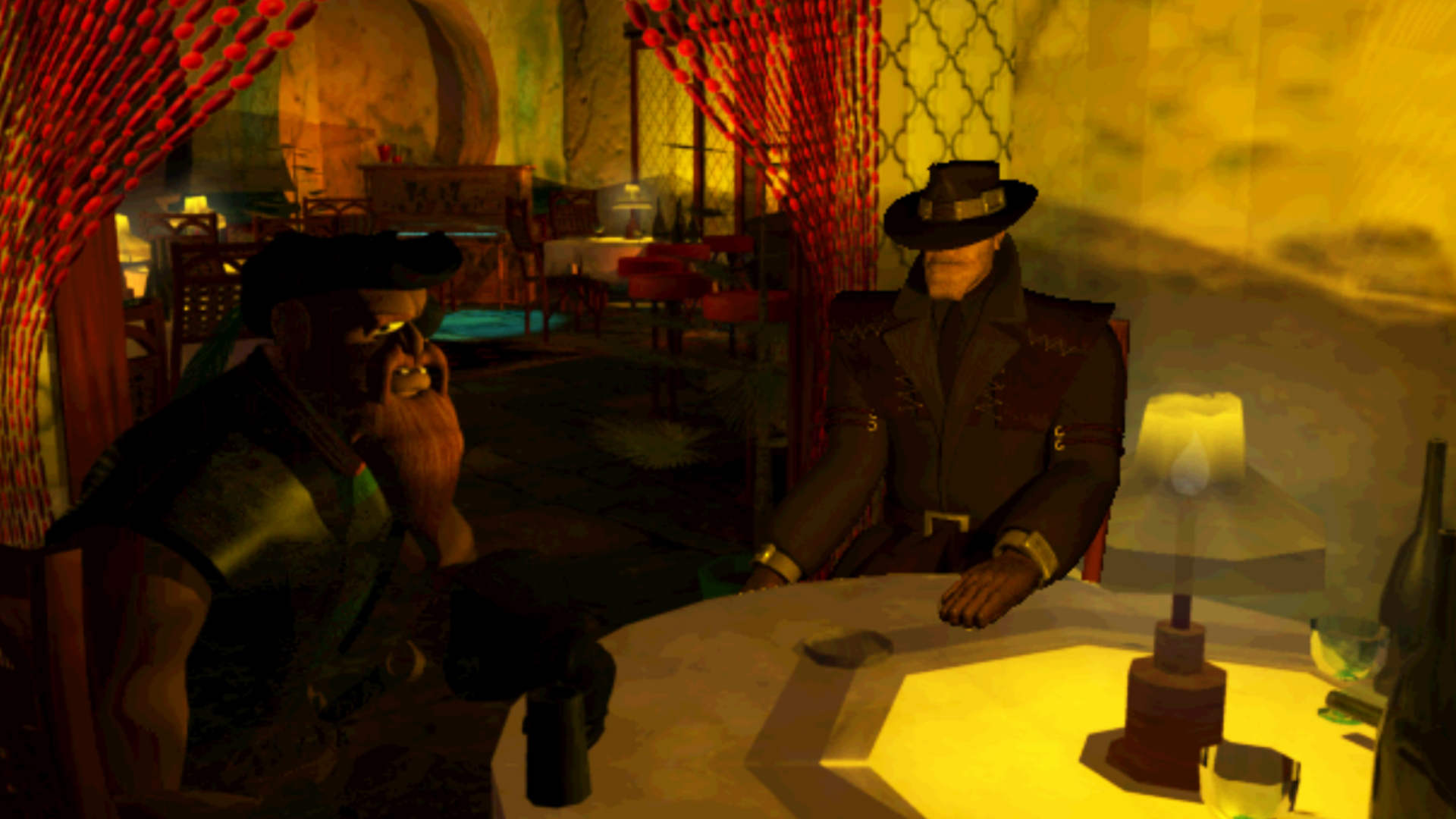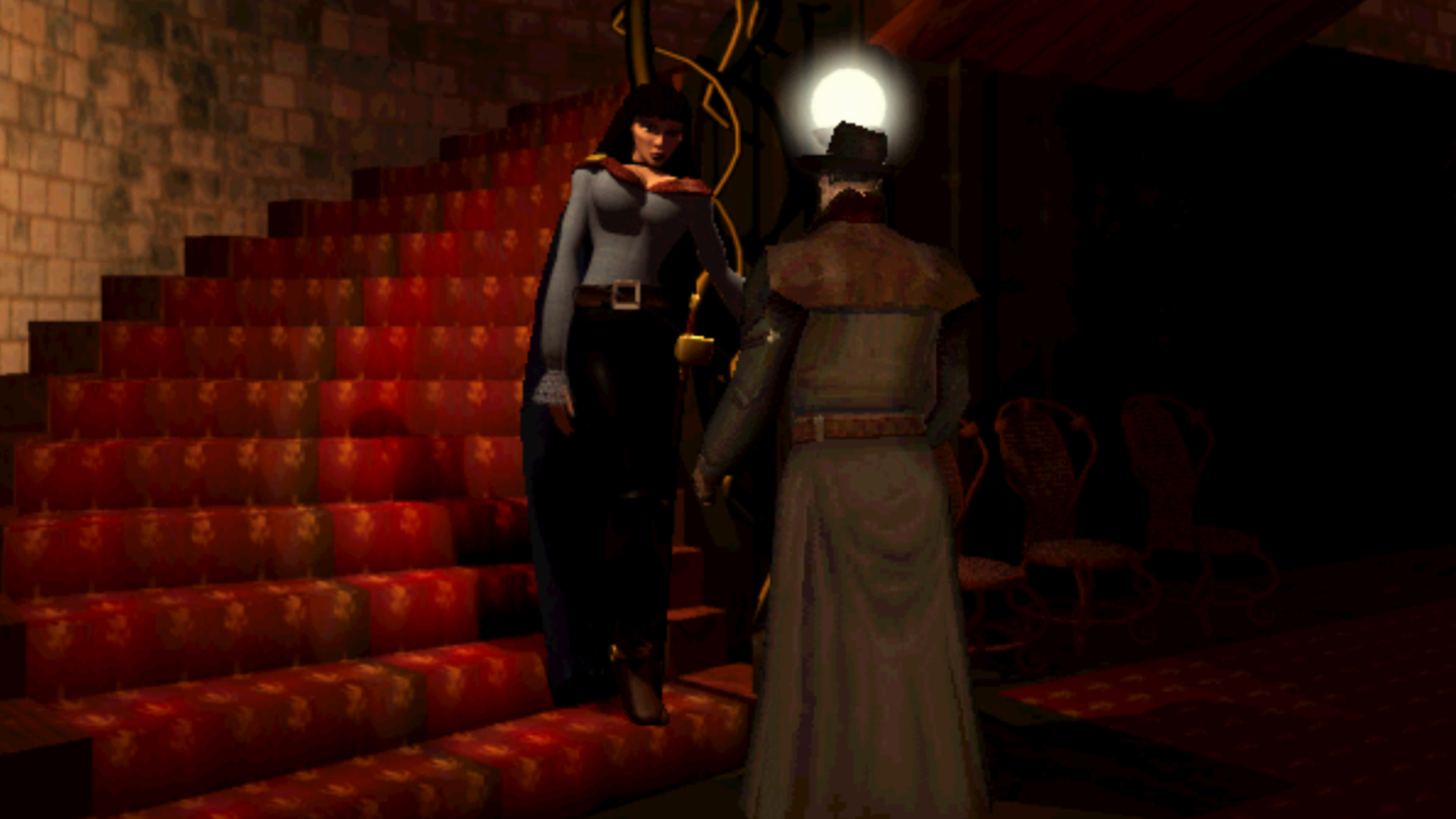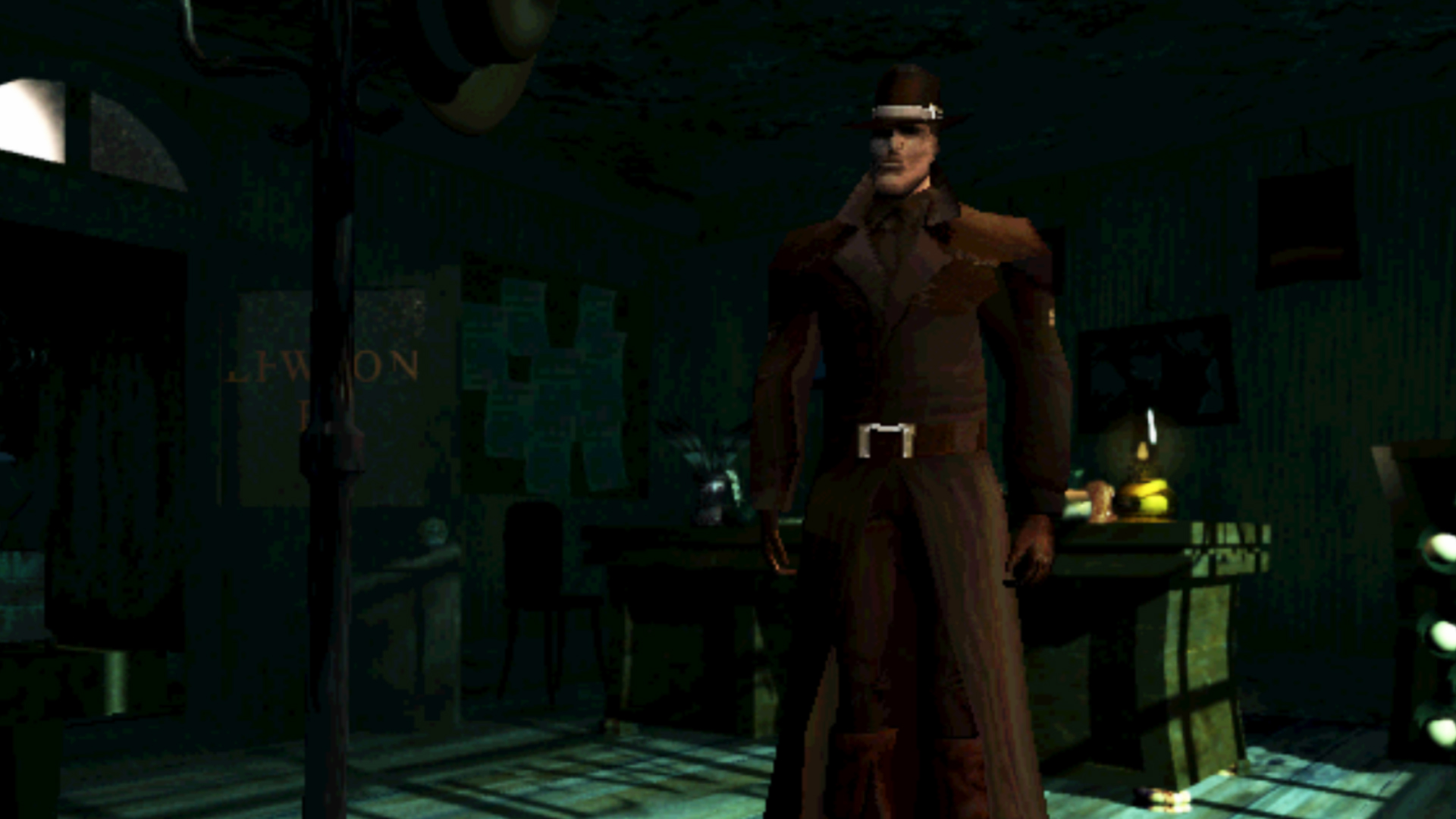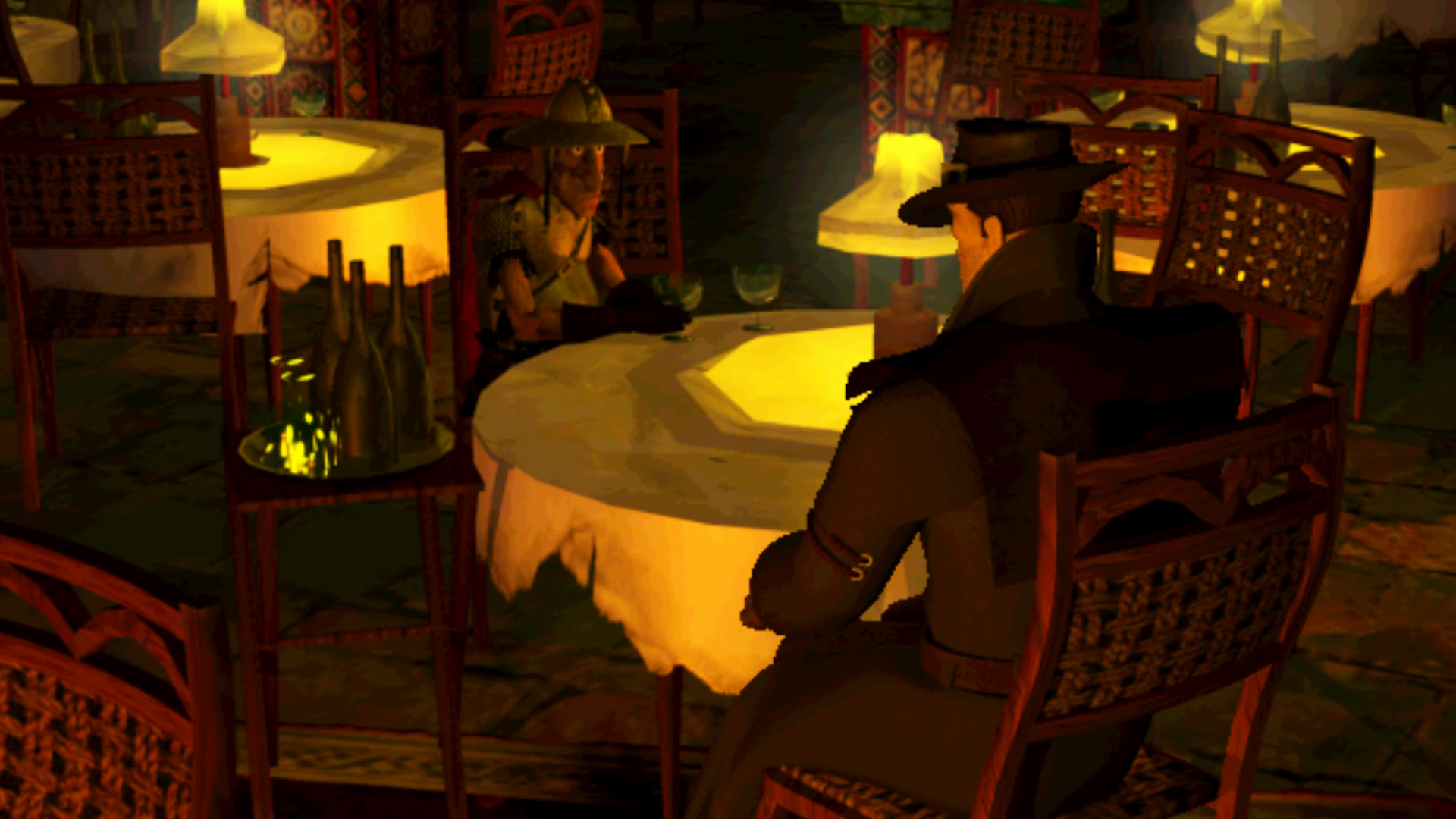Fantasy and hard-boiled detective fiction collide in cult adventure game Discworld Noir
Solving a mystery on the mean streets of Ankh-Morpork.

Discworld is a series of fantasy novels by the late, great Terry Pratchett, famous for its slapstick humour and scathing social commentary. And at the heart of some of his best stories is Ankh-Morpork, a massive walled city rife with corruption, pollution, and social division. While the first two Discworld adventure games, starring hopeless wizard Rincewind, were colourful, light-hearted capers, Discworld Noir uses the rain-soaked streets of Ankh-Morpork as the backdrop for a shadowy crime thriller, taking stylistic cues from film noir and hard-boiled detective fiction—particularly the stories of Raymond Chandler.
It's a familiar detective yarn, but set in an irreverent fantasy world filled with trolls, ghouls, and vampires. Our cynical, world-weary hero is Lewton, a former member of Ankh-Morpork's famous City Watch turned private eye. A beautiful, mysterious woman, Carlotta, walks into his office one dark and stormy night and asks him to find her ex-lover: a man named Mundy. And like any good Chandlerian mystery, this seemingly simple job quickly spirals into something much more complex and dangerous.

Like the novels that inspired it, Discworld Noir is heaving with subtle (and not-so-subtle) pop culture references. Samael, a vampiric pianist in a smoky dive called Cafe Ankh, is an amusingly on-the-nose homage to film noir classic Casablanca. Lewton even says "Play it again, Samael." I probably should have rolled my eyes at that point, but in the moment it was pretty funny. And when Lewton meets Count Überwald, a rich old man in a wheelchair hiding away in a greenhouse, Philip Marlowe's similar meeting with the reclusive General Sternwood in The Big Sleep comes to mind.
A lot of adventure games plunder from film noir, whether it's Grim Fandango (itself partly inspired by Casablanca) or corny FMV games such as The Dame Was Loaded. But, importantly, Discworld Noir never feels stifled by its reverence to the greats of the genre. It has enough personality of its own—thanks mainly to the inherently unique Discworld setting—to feel like more than just a pastiche. And when Lewton gains the ability to transform into a werewolf in the third act, it becomes even more distinct. Bogie never sprouted fangs and fur.
Like the Discworld novels, Discworld Noir is heaving with subtle (and not-so-subtle) pop culture references
Playing Discworld Noir for the first time, I'm surprised by the lack of puzzles. Knowing it was a point-and-click adventure from the 1990s, I'd braced myself for combining absurd objects in increasingly contrived ways, but found myself mostly just talking to people. In this sense, it's a truer detective game than most. As Lewton speaks to the citizens of Ankh-Morpork, a noirish trumpet drone indicates a clue being written down in his notebook. This then opens up further conversation options, creating a labyrinthine trail of clues that eventually snakes towards… well, I won't spoil it, but the story takes some interesting, and unexpected, turns.
It's slow, though. At times painfully so. The dialogue is entertaining, mostly funny, and the actors do a fine job. But there are so many conversations that I would have actually appreciated a preposterous item puzzle, just to mix things up. And I often found myself at a dead end, unable to progress because I hadn't talked to the right person at the right time about the right thing, leaving me wandering the streets of Ankh-Morpork, clicking on everything, trying desperately to pick up the breadcrumb trail.

In the second act, a series of unfortunate events results in Lewton becoming the prime suspect in a spate of killings known as the Counterweight Murders. Sam Vimes, head of the City Watch and a major character in the Discworld novels, fingers Lewton for the crime, and this causes a chain reaction of bad luck for the permanently unlucky private dick. By the end of the game Lewton will have encountered a sinister cult, a talking dog, a magical sword, and other weirdness besides. It's a wonderful mess of a story with a few great moments, but overall it gets a bit too complicated for its own good. Then again, that is a signature of the detective novels from the 1940s that inspired the game.
The biggest gaming news, reviews and hardware deals
Keep up to date with the most important stories and the best deals, as picked by the PC Gamer team.
Terry Pratchett was involved in the creation of Discworld Noir, providing a story outline and editing the script—the meat of which was actually written by author Chris Bateman. For the voice of Lewton and other characters including Nobby Nobbs, who Discworld fans will recognise, Welsh comedian Rob Brydon was hired. At the time Brydon hadn't done much besides voice work, but has since made a name for himself in popular UK sitcom Gavin & Stacey, and with Steve Coogan in the magnificent The Trip. The cast also includes Robert Llewellyn (best known for playing Kryten in Red Dwarf), and Kate Robbins.
It's a wonderful mess of a story with a few great moments
Robbins, who plays every female character in the game, recorded her parts in a day, while Brydon, according to Bateman, endured a "gruelling week" to complete his. But the result is a brilliantly acted game, with Brydon really throwing himself into Lewton's comically overwrought monologues. "The troll stepped out of the shadows like light was too intimidated to illuminate him," he says in the tough, clipped style of an old Hollywood detective. Later, "I like my whisky straight up, with a whisky chaser." I also enjoyed his rant to a former lover in a bar, where he laments, pathetically: "You don't know what it's like to go into a restaurant and ask for a table for one."
Compared to some other detective games, you don't have to do much actual legwork in Discworld Noir. There's no manually piecing clues together as in Frogwares' brilliant Sherlock Holmes: Crimes & Punishments, no tense L.A. Noire-style interrogations. But as the clues pile up in your notebook, knowing which threads to pull makes you, very occasionally, feel like you're doing some real detecting. There are a lot of characters in Ankh-Morpork, and a lot of conversation topics, which means it's easy to venture down the wrong path and waste time chasing phantom leads.

However, Lewton's aforementioned transformation into a werewolf does mix things up. In this form he can literally sniff out clues, picking up scents—visualised as colours—that are associated with certain characters. This supernatural twist adds an extra layer of complexity to your investigation, giving you more threads to yank and untangle. The werewolf stuff is also introduced fairly late into the game, which is a pretty bold design decision when you think about it. Most games would hinge entirely around a concept like this and not just throw it in towards the end.
The smell system is a little clumsy to use, though. All the scents you've picked up are stored in an inventory of sorts, and if you've identified the source of one their name will appear when you hover over it. Then when you encounter a scent during your investigation, you can drag one out of your smell-ventory and see if they match. That might sound fine, but it's clunky in execution—and it doesn't help that the colours of some of the scents are almost identical to each other. But hey, I always appreciate a developer trying to do something fresh and imaginative with the adventure genre.
In 1999, the year Discworld Noir was released, its London-based developer Perfect Entertainment was permanently shut down. A costly legal dispute with Psygnosis over unpaid royalties was instrumental in its demise, and the final year of the game's development was plagued by staff shortages, rescheduled deadlines, and late salary payments. To make matters worse, its publisher GT Interactive was having financial troubles of its own, with losses of $90 million leading to the company being massively downsized and sold to Infogrames. As a result, Discworld Noir was never released outside of Europe and faded into obscurity.
Unfortunately, running Discworld Noir on a modern PC can be an ordeal. I couldn't get it to cooperate with Windows 10 at all, so had to install a Windows 95 virtual machine to play the thing. And because both developer Perfect Entertainment and publisher GT Interactive no longer exist, the chances of anyone getting a hold of the source code and remastering it are pretty slim. But, in a weird way, that's all part of its legend. It's always been hard to find and hard to run—something you have to work to play—and I like that in this age of instantly accessible entertainment.
But is it worth the hassle? Honestly, I don't think Discworld Noir is a classic. It looks ancient compared to Grim Fandango, which was released only a year earlier. The pace is languid, the story meandering, and there isn't much to do besides sit and listen to people talk. It's incredibly dark, which results in some frustrating pixel hunting as you try and find an interaction point among the gloom. But I still think it's worth playing, if only for its atmosphere, which captures the downbeat, nihilistic feeling of a film noir better than most games. There are much better point-and-click adventures out there, but few that draw you into their setting quite so completely.
With the sad death of Terry Pratchett in 2015, the chances of there ever being another Discworld game are pretty much zero. So this makes Discworld Noir, and the two Rincewind adventures, even more special. But one of the brilliant things about Discworld Noir is that you don't have to know a thing about Pratchett's intricate universe, or have read any of his 41 novels, to play it. You might miss out on a few references, but for the most part it's a standalone story. Now you'll just have to decide whether it's worth the bother of installing a virtual machine on your PC to play it.
If it’s set in space, Andy will probably write about it. He loves sci-fi, adventure games, taking screenshots, Twin Peaks, weird sims, Alien: Isolation, and anything with a good story.


